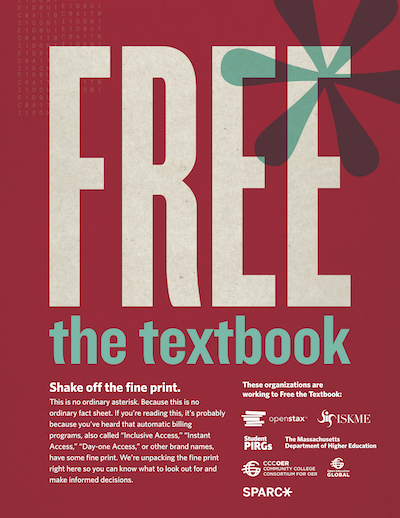Not so inclusive.
After decades of driving the cost of print textbooks to unaffordable levels, major publishers are pushing a new model: automatic textbook billing. Known as “Inclusive Access,” “First Day,” and other brand names, these programs automatically opt students into digital course materials that get charged to their tuition and fee bill. While it is easy to see how automatic billing benefits publishers, it can leave out students who are in the most critical need. SPARC is working to help institutions decode “Inclusive Access” and prioritize open models that ensure that academic institutions and educators—not publishers—decide how students learn.
Free the Textbook
SPARC Resources
The fine print of automatic textbook billing is about much more than charging student accounts. The growth of “Inclusive Access” is part of the publishing industry’s broader trend toward acquisition of critical infrastructure, which SPARC continues to document through our Community-Owned Infrastructure initiative. When a student is automatically opted-in to a digital textbook, they are also effectively forced to accept the attached terms of service, privacy policy, and data collecting practices as a condition of taking the course. As publishers acquire more data analytics infrastructure, institutions lose more and more control.
SPARC’s Roadmap for Action offers a framework for institutions to take individual and collective action to retain control over critical infrastructure. Here are some key actions that institutions can take right now to interrogate the fine print of “Inclusive Access”:
- Take an inventory of campus contracts pertaining to automatic textbook billing and digital course materials, then conduct a risk assessment regarding vendor lock-in, data privacy and security, compliance with applicable laws, and long-term cost projections.
- Use a rigorous methodology to reassess the potential savings of automatic textbook billing. Ensure savings are calculated based on the market price of an equivalent digital product (not print), and factor in the increased cost to students who would otherwise purchase used books, print rentals, or course reserves.
- Consult faculty and student governance bodies before implementing an automatic textbook billing program. Promote a robust debate on the implications for academic freedom, accessibility, and affordability for students, and a fair process to obtain consent from students.
- Carefully examine the privacy policies, terms of service, and data collection practices of any vendors for alignment with institutional legal obligations and values. Ensure that students have a real and meaningful way to decline having their personal data processed without sacrificing their grades.
- Engage in a campus-wide conversation about what it means to make access to course materials equitable for students and faculty. Evaluate any potential course material distribution model with equity in mind, and for its alignment with institutional values. Always consider open educational resources first.
- Say no to automatic billing until the risks and costs can be fully assessed, stakeholders consulted, meaningful consent mechanisms established, and the model evaluated for its alignment with institutional values. Don’t sign a contract without reading U.S. PIRG’s recommendations and SPARC’s contract library.
